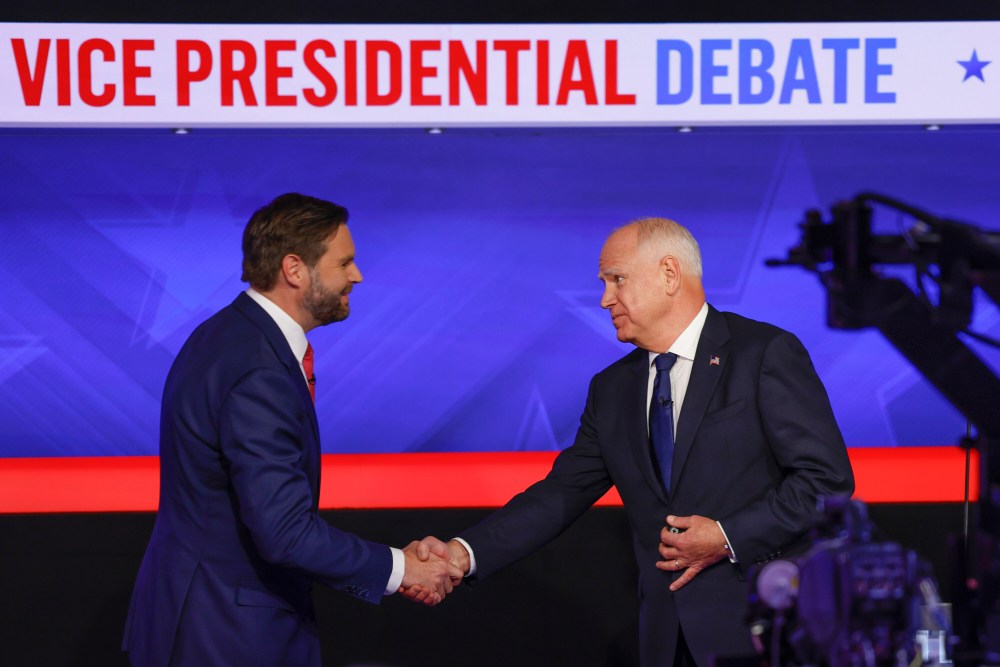The Vice Presidential debate between Minnesota Governor Tim Walz and Ohio Senator JD Vance, was one of the most polite political stages seen the past few election cycles. The 90-minute face off between the two men duking it out to be second-in-command was a spectacle in that it was a night of civil oratory discussion – edging on even exchanging polite pleasantries.
The debate, held this past Tuesday night in New York City and hosted by CBS, was surprisingly (maybe even boringly) civil. These men were well trained, conditioned, and prepared to argue their sides. It was clear they each understood that they are merely proxies for their running mates’ policies. Walz, as a past football coach, knows how to cheer for his team. While Vance, as a former Marine, knows how to fall in line with his superior’s stances.
Governor Walz, although starting out rough, discovered his cadence as the debate went on. He continuously cracked down on issues with substantive arguments. Ohio Senator JD Vance remained calm and polite towards his opponent, with the presentation skills expected of a Yale-educated lawyer.
Rachel Maddow with MSNBC summed it up directly after: “I wouldn’t describe them as evenly matched because they are so different.. I think the big picture takeaway from this is that one of them is much slicker than the other…and then the other one won.”
Arguably the most viral moment of the night would be Vance’s microphone getting muted after being fact-checked on Haitian immigrants in Springfield, Ohio. He continued the racist rhetoric started by Trump, to which the moderators clarified on the legal and protected status the community has.
“The rules were you guys weren’t going to fact-check,” Vance said before being muted.
But the moderators, Norah O’Donnell and Margaret Brennan, kept the men on track and kept the pacing up. They covered issues from the economy, reproductive rights, and the cost of living. The women confronted the men with their own track records: They questioned Vance on his previous anti-Donald Trump statements, and confronted Walz on discrepancies with comments and timelines in the past.
Brennan proposed to Vance, “If you become Vice President, why should Americans trust that you will give Donald Trump the advice he needs to hear, and not just the advice he wants to hear?”
Vance responded by assuring the public that the stories of Trump were “dishonest fabrications” by the media.
Walz was also questioned on why he changed his stance on gun control. Once praised by the NRA, Walz was dropped from the organization’s recipients after he met with the parents of a victim of Sandy Hook, which changed his politics on the issue.
Gun violence is the leading cause of death for children from single-digit ages to their teenage years. In the past two decades, gun violence has surpassed drowning, car accidents, and food allergies as the biggest threat to children. On average, 12 children will die per day from gun violence.
There have been over 300 instances of gun violence across college campuses in the United States since the 1960s.
Vance answered first on this issue, seizing the opportunity to call Kamala Harris the “border czar” and citing illegal firearms crossing from Mexico into America as the culprit. He called for heightened security in schools, stronger class, and empowered school enforcement officers.
“We understand the Second Amendment is there but our first responsibility is to our kids to figure this out,” said Walz in rebuttal. “This idea that we should just live with it…that’s not far enough.”
The debate took a jarring pivot to reproductive rights, which is one of the largest issues aside from gun violence and the cost of living.
While Walz cited his long political career, Vance routinely referred to this vague dogma of “common sense” politics, “pro-family” values, and “peace through strength” policies. (For those who haven’t read the Project 2025, the proposal Trump has been attempting to distance himself from, those repeated sentiments appear throughout the 900 pages.)
As this is the first instance since 1996 in which both tickets have a VP candidate who has served in the military (Vance was a Marine and Walz served with the National Guard for 25 years) there might have been the expectation that more veterans’ issues would arise – especially since Vance has questioned Walz’s service and accused him of dropping out when his unit received deployment orders. (This is the report from the Minnesota National Guard at the time.) However, the topic was largely absent from the evening.
Historically, VP debates have rarely moved the needle significantly during presidential elections. However, most Gen Zers are accustomed to elderly candidates who merely impress with their ability to survive the four years.
The Vice President’s position had a slightly mistrustful connotation. During the Trump administration, an undercurrent of fear rippled throughout the LGBTQIA+ community as Pence’s homophobic policies gained traction.
Some still remember the day Harris was chosen as the first woman to be nominated for VP from a major party – and then she won, solidifying her place in history as the first female VP, let alone the first female of color in such position.
This was the first political debate in some time where the candidate’s age was not in the spotlight at all. Walz, 60, and Vance, 40, seem clear-minded, focused, and determined to win the election for their running-mate.
There are 32 days until election day, and early-voting is open.

